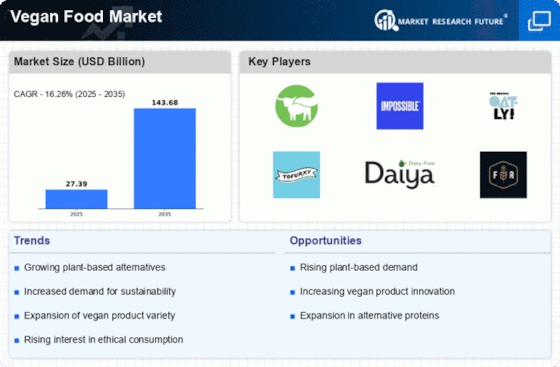Top Industry Leaders in the Vegan Food Market
 The competitive landscape of the vegan food market is characterized by robust competition among key players, who are strategically positioning themselves to capitalize on the growing demand for plant-based alternatives. As of 2023, the industry is witnessing dynamic developments driven by various factors, including established players' strategies, the emergence of new companies, industry news, investment trends, and recent developments.
The competitive landscape of the vegan food market is characterized by robust competition among key players, who are strategically positioning themselves to capitalize on the growing demand for plant-based alternatives. As of 2023, the industry is witnessing dynamic developments driven by various factors, including established players' strategies, the emergence of new companies, industry news, investment trends, and recent developments.
Key Players:
- General Mills Inc.
- Amway
- Conagra Brands Inc.
- Cargill Incorporated
- Abbott Laboratories
- Kraft Foods Group Inc.
- The Coca-Cola Company
- PepsiCo Inc.
- Atkins Nutritionals Inc.
- Brunswick Corporation
Strategies Adopted:
To stay competitive and maintain market share, key players in the vegan food market adopt a range of strategic initiatives. Product innovation is a cornerstone, with companies constantly developing new plant-based offerings to cater to evolving consumer preferences. Beyond Meat and Impossible Foods, for instance, continue to invest heavily in research and development to enhance the taste, texture, and nutritional profile of their products. Strategic partnerships with restaurants, retailers, and foodservice providers are also common, expanding the availability of vegan options to a broader consumer base.
Factors for Market Share Analysis:
Market share analysis in the vegan food sector involves evaluating various factors critical to consumer choice. Product taste, nutritional value, pricing, and brand reputation are key determinants influencing market share. Additionally, effective marketing strategies, including digital and social media campaigns, play a pivotal role in building brand awareness and influencing consumer decisions. The ability to meet diverse dietary preferences, including gluten-free, soy-free, and allergen-free options, is increasingly becoming a crucial factor in market share analysis.
New and Emerging Companies:
The vegan food market is dynamic, with new and emerging companies continually entering the space. These companies often bring innovative solutions, catering to niche markets or introducing unique products that address specific dietary preferences. The agility of these newcomers allows them to quickly respond to emerging trends, challenging the market dominance of established players. As consumers seek variety and sustainability in their plant-based choices, new entrants contribute to the overall diversity and competitiveness of the industry.
Industry News and Current Companies:
Industry news and updates play a pivotal role in shaping the competitive landscape of the vegan food market. Ongoing developments such as mergers, acquisitions, and collaborations impact the market dynamics. Companies are closely monitored for their response to emerging trends, regulatory changes, and consumer demands. The ability to navigate challenges such as supply chain disruptions and fluctuating raw material costs is essential for sustaining competitiveness in the industry.
Investment Trends:
Investment trends in the vegan food market highlight the industry's potential for growth and innovation. Investors are keenly interested in companies that demonstrate a commitment to sustainability, ethical sourcing, and continuous improvement in product quality. Strategic investments in production facilities, distribution channels, and marketing efforts indicate a company's readiness to capitalize on the increasing consumer shift towards plant-based alternatives.
Overall Competitive Scenario:
The vegan food market is characterized by a highly competitive environment, driven by the pursuit of market share and consumer loyalty. Companies engage in constant innovation to differentiate their products and gain a competitive edge. Pricing strategies, supply chain efficiency, and global expansion efforts contribute significantly to the overall competitive scenario. Partnerships with retailers, restaurants, and foodservice providers are crucial in expanding market reach and accessibility.
Recent Development
The vegan food market witnessed significant developments reflecting the industry's evolution. Key players announced strategic partnerships to strengthen their presence in specific regions or to diversify their product offerings. Beyond Meat, for instance, entered into collaborations with major fast-food chains to expand its presence in the mainstream market, while Oatly continued to forge partnerships with coffee shops to promote its plant-based milk alternatives.
Moreover, sustainability initiatives gained prominence, with companies focusing on reducing their environmental footprint and adopting eco-friendly packaging solutions. These developments align with the growing consumer awareness of the environmental impact of food choices, further shaping the competitive landscape of the vegan food market.

- Beta
Beta feature

